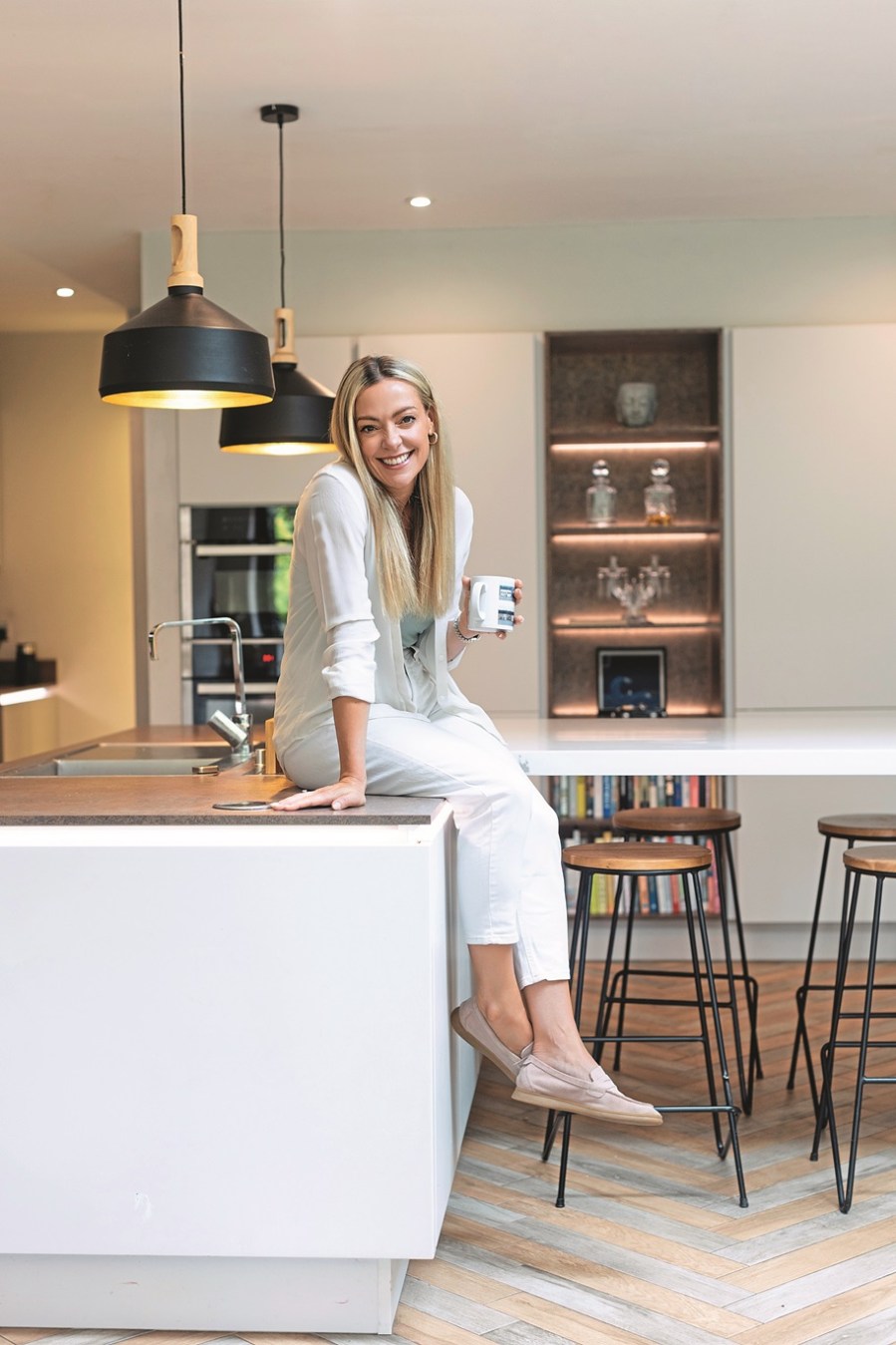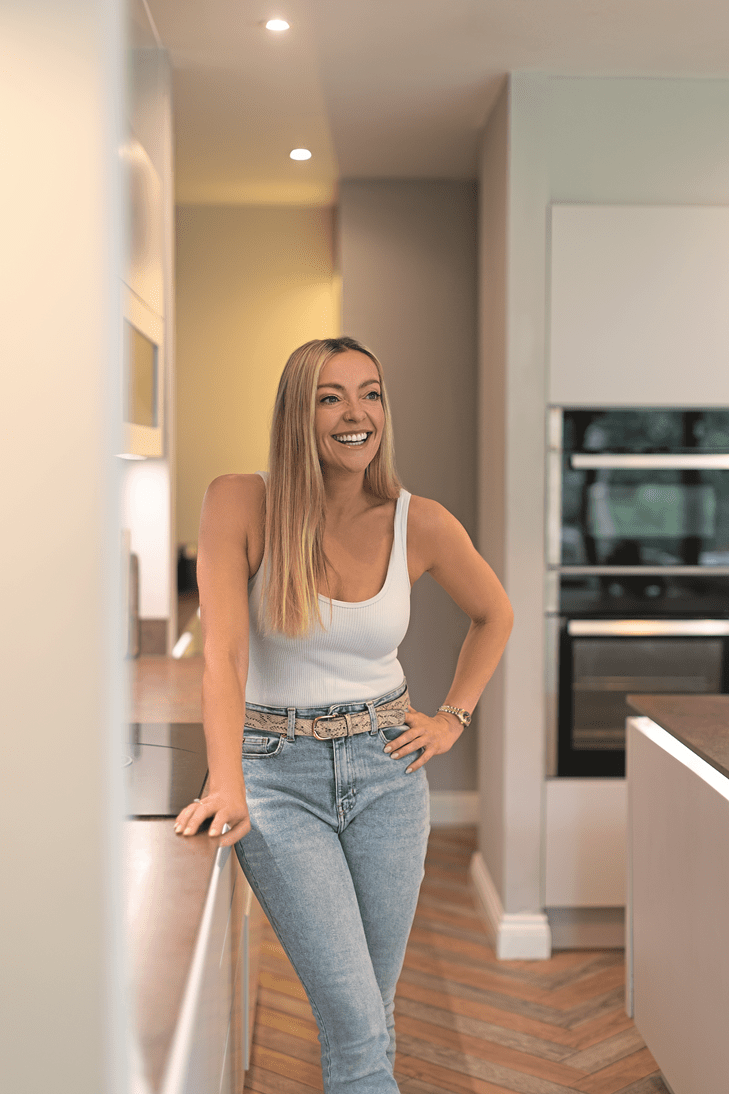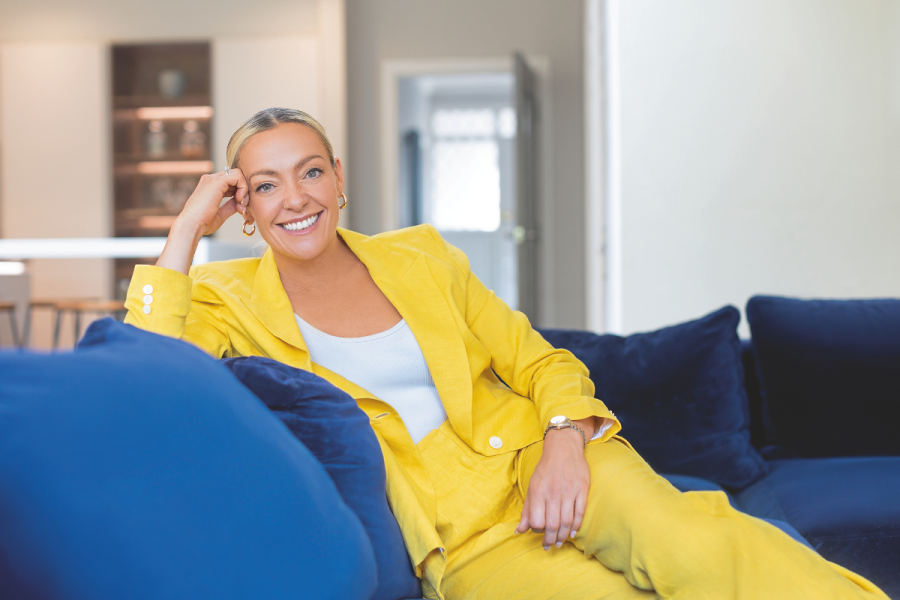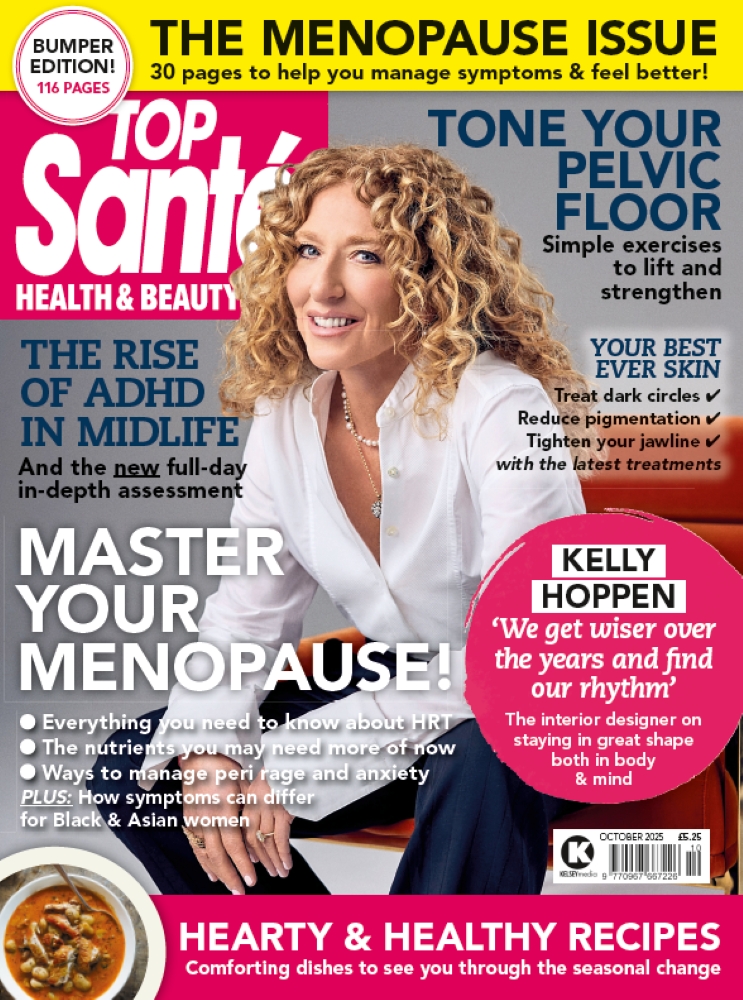TV presenter Cherry Healey, 43, chats to editor-in-chief Katy Sunnassee about how perimenopause crept up on her, the therapy she undertook to rewrite her negative attitude to her body and food, and the lifestyle changes she’s embracing now to feel good both inside and out.
Words: Katy Sunnassee. Images: Rosie Parsons. Make-up: Cinta Millar.
My friends didn’t believe I was perimenopausal. I was having a dinner with 10 girlfriends last year and they asked why I was banging on about it all the time. They said I was way too young for menopause. I had to convince them I wasn’t. It was exactly when I turned 40 that I began having symptoms. And they all said: ‘Gosh we have those things too!’ to which I said, ‘Well you’re probably perimenopausal!’.
One of the first things to be affected was my sleep. I’d wake at 4am with a panic attack. I’m not normally an anxious person. Of course, I get anxious like anyone would doing something new but I never had random anxiety or whole days when I could barely function. When I hit 40, almost on the nose, I started finding I wasn’t dealing with normals situations in a calm way. I was questioning my judgment on everything. I couldn’t make decisions. I was responding badly to alcohol too. If I have too much white wine, the next day I’ll be anxious all day, and it really disrupts my sleep. I take a supplement called Better Sleep by The Better Menopause (£43, thebettermenopause.com) which helps, and their gut supplement too.
Mostly, perimenopause affected me in terms of my confidence. I’m normally pretty happy and find it easy to get up in the morning and feel motivated. But I was struggling to get out of bed because I was so anxious about what was coming.
I didn’t understand why I was waking up in the middle of the night with panic attacks. It affects every part of your life. You start to question whether you can even do your job. Until we started talking about menopause more openly, women though they were going a bit crazy. They left their jobs, they left their husbands, they argued with their children. They were thought of as grumpy. But all these women leaving the workforce costs the economy billions. You are losing all of that wisdom, all of that knowledge.
Women think, “I need to leave my job and go and do something else that doesn’t require as much brain capacity” when in fact a change in lifestyle, perhaps a little bit of HRT, can bring that woman back to life. But I think I also didn’t realise that HRT was so easy as in it could be a little bit of gel on your wrist. I thought that it was a great big medical intervention.
For me at the moment it’s all about lifestyle changes. I’m not on HRT but I take a few supplements, one of which is The Better Gut (from £46.80, thebettermenopause.com), which helps with my digestion. I’m trying a new progesterone-based contraception so my body’s having to adjust to that. And with this new one I find that if I don’t take it regularly it makes a difference. I missed taking it by just half a day last week and my body went “Period time! Here we go!”.

So, I’ve not only got my natural hormonal changes, I’ve got the ones I’m giving to my body artificially. But it makes sense that periods are going to change at this age because our hormones are changing and they dictate our periods. But it’s still unnerving. You’ll want to go to the theatre, go swimming, go on holiday and you think “how many tampons do I need to take?”.
And then sometimes you don’t have any and you get caught by surprise. Even at age 43 I still occasionally have to do the rolled up tissue paper workaround! I don’t know when I will stop doing that. And I don’t think I’ve fully tuned in to my monthly cycle and bodily changes. I will notice the changes with hindsight and think “Oh, that’s why I wanted to eat everything! That’s why I didn’t want to go out. That’s why I wasn’t really proactive or feeling great”.
Food-wise, making sure I eat enough protein and enough fibre seems to have worked. I have to be careful with sugar, caffeine and alcohol because they seem to really affect me now, especially caffeine. I love coffee but caffeine makes me more anxious. And sometimes I won’t have had any alcohol or coffee and yet I’ll still get days when I’m anxious. At those times, I will message my friends and I’ll tell them how I’m feeling. They’ll remind me my thoughts are not always real. To get a text from a friend to say ‘I hear you. I understand you’ is comforting.
Sometimes the anxiety comes from feeling like you can’t perform at the same level. I think when you start to have changes in your brain that make you lose trust in yourself, it can be unnerving. You think, “I didn’t react normally to that” or “I didn’t come across so confident, I forgot important information”, then you start to lose trust in yourself and in how you’re going to react in pressured situations.
You can start to question yourself and that’s when things can unravel. I think it’s really important to talk about this and normalise it because for a woman who is in a high-pressure job, it’s scary. I’ve heard of women who start to question their sanity but they go to the doctor and they’re prescribed antidepressants and it’s not the right prescription for them. In fact, sometimes antidepressants can make things worse. If it’s a hormonal change, you need replacement of hormones or lifestyle changes.
When it comes to brain fog and mental health issues, women hide it because they feel like people will think they’re incompetent and they’ll either be fired or won’t get promotions or other jobs. But there are solutions. Hiding the problem is a horrible feeling as you’re constantly trying to cover things up and then you don’t get the help you need.

The first hour of the day is the most important in terms of what I do and consume. If I let myself scroll on social media and drink coffee and lie in bed, then the rest of the day is a real struggle. I’ll let myself listen to a bit of the news to know what’s going on but then that’s it for the rest of the day because I think too much news can bring you down. Look at your morning routine: are you scrolling on your phone first thing? Are you needing 3-4 cups of coffee to get going? As someone who’s experienced anxiety, I’ve been conscious to not make it worse with caffeine. I really think that first hour will dictate the rest of your day.
I won’t touch alcohol if I’m filming the next day as the last thing I want is to be feeling anxious or detached. There’s no way I can bring good energy to a set if I’m feeling that way. So I just don’t touch it. But if I’m not working and I’m out with my friends, I might have a glass of wine. That’s normally fine. But if it’s any more than that, I’ll be groggy, heavy, tired and anxious the next morning. I just won’t have that spark that I prefer to have. If it’s a birthday or it’s a special occasion or date night, then I might want to have a glass wine or two and maybe a margarita but the next day I’ll at least know why I feel so bad.
I’m much more conscious now of what I’m eating. I was way too focused on it in my 20s but in a negative way as it was all about trying to be skinny as that was the look in the 90s. I’d be eating diet foods, you know, lots of low-fat cottage cheese on celery and diet drinks and lots of everything with sweetener in it. Even though I’ve always been athletic and sporty, back then it was all about being thin. Being athletic as a woman was not celebrated in the 90s.
In my 30s I knew my relationship with my body and with food wasn’t good. I remember my daughter, who was a tiny baby then, coming into my room in her nappy and turning around and looking at her bum in the mirror, but she was just copying mummy! I was always checking to see if my bum was too big. And I remember in my 30s thinking I needed to sort my head out as life had to be about more than obsessing over food.
My dad was unwell at that time so I went to see a therapist. I said to her: “I need you to help me with this difficult phase in my life. And by the way, since I’m here, can you help me with my attitude towards my body and food?” So, I kind of went in because I was struggling with my dad being unwell but we ended up working on my perspective around food and it helped so much. At one point I remember saying to her that I didn’t even know who I would be if I were to stop thinking about food and my body.

She gradually helped me switch my thoughts and feelings to ones of love and appreciation for my body. I learned to say lovely things about my body and also say them out loud in front of my daughter. I learned to stop thinking of food as an enemy or as negative. I learned to think in a positive, grateful, wonderful way. She just switched my brain around and it had such a profound impact on me. And I hope I’ve done everything I can to not pass on any of my hang-ups to my children.
I’ve been very conscious of how I talk about myself, especially in front of my daughter. If I’m wearing a dress I love, I’ll say, ‘I love this dress and it looks great on me. I feel great today!’. I won’t say things like, ‘Oh, I shouldn’t have eaten that’. And it’s had a really big impact on me because I stopped dieting. I started to fall in love with food and follow my appetite and it worked. My weight stabilised for the first time in my entire life. Before that I’d be underweight, then overweight, then underweight, then overweight, over and over. I was either starving myself or comfort eating and feeling awful that I put on weight. There was never any peace or enjoyment. I’d go out for dinner and choose the lowest-calorie option, then I’d be starving and go home and eat loads because my body’s survival instinct was stronger than my desire to be thin.
I’ve been lucky to be around people who know a lot about nutrition. I’ve learned about what the body needs to thrive. Now, because I’m listening to my body in the evenings, I’ll have lasagnas and stews and pasta and huge salads and salmon. When I go to restaurants I’ll order the most delicious thing on the menu. Back when I was starving myself, I would overeat as I knew I would starve myself the next day to make up for it, which wasn’t good. Whereas now if I’m full, I’ll stop eating because I trust that I will let myself eat the next day, and not try and starve myself to make up for a night out. It’s about showing myself love. It’s about allowing myself to eat nutritious, healthy, gorgeous, lovely food. Oh, and also eating cheesy fries and nachos once in a while!
One of the great joys in life is being on holiday and having a big bowl of crisps and a glass of cold, white wine while watching the sunset. That is pure joy. Or a Friday night margarita with nachos watching a film and having a gossip. I never ever want to have that margarita and worry about it. Life is too short. I wouldn’t do it every single day though.
My relationship with food is now great and has changed again since becoming perimenopausal. I’ve had to up my protein and have 25g at each meal. I know now how much protein is in most foods: you can get 25g from three eggs, from a quarter of those big pots of Greek yoghurt, and in a chicken breast. So, I’m just making sure I’m conscious of how much I’m having throughout the day because I want to maintain muscle mass and strength and thrive as I grow older.

I’ve always been sporty and I love exercise and do something almost every day. I’m like a labrador – I have to do some kind of exercise. These days I do a lot more weight training as when we get older we lose one per cent muscle mass every year.
I wasn’t focused in the past on weights as I didn’t want to bulk up, but now I’m training for Hyrox (a competition made up of functional fitness moves that is taking the world by storm – see hyrox.com), and I’m loving the weight training! I also do a lot of yoga and Pilates for mobility too and also sometimes dance. I did breakdancing at university, although I cringe now at the thought!
For me, exercise is about discipline – like brushing your teeth. I wouldn’t ever leave my house without brushing my teeth. It’s the first thing I do in the day. I just do it automatically. And the sweet spot for me is when you can make exercise as natural and habitual as brushing your teeth so that you wouldn’t consider not doing it.
The great thing about being disciplined is that even if you’re feeling bad, or anxious, and want to curl up on the couch, you still automatically go to the gym or work oout without thinking about it. I’ll always exercise first thing because my resolve dwindles throughout the day.
Exercise can change my mood – it resets me. Last year was difficult for lots of reasons; I had some huge personal challenges and one of my family members was unwell. But exercise helped me stay on top of things and not sink down. That’s when a routine will serve you very well. If you let life break your good habits, it’s difficult to get back on the wagon, and harder to force yourself to go back.
I just remember thinking I was so glad to be in the habit of going to the gym because there were days when I woke up and didn’t know how I’d face the day. I was also really heartbroken. There were lots of times I wanted to stay in bed and hide. But because I’d already trained myself to go to the gym, it was like clockwork. I’d have a hug from someone there, I’d do my workout, and by the time I got out at 9am I was ready for the day.

I remember feeling so unbelievably grateful that I had exercise in my life. I’m sure it got me through when I just wanted to sit on the sofa and eat Doritos all day. So exercise has been a good friend to me. It’s not just about doing it when I feel like it, but because it saves me when I don’t feel like doing it.
My motivation for exercise has changed so much in different chapters of my life. At school the motivation was to be a valuable part of the lacrosse team and win the match on Saturday; in my late teens and 20s it was just to lose weight so there was a lot of cardio, but that was not good mentally because my focus was on the wrong thing; in my 30s it was about trying to find any time whatsoever to exercise around the kids; now, in my 40s, I have more time and the motivation is for longevity, which is a much healthier mindset.
I want to be stronger, I’m looking for definition in my arms. I’m not looking to have that 90s aesthetic, which thankfully isn’t in fashion anymore. Being a waif was the only way to be feminine in the 90s and now that couldn’t be further from the truth.
I love that being sporty and strong is now acceptable for a woman. In the 90s it wasn’t sexy or feminine to have muscles but now we are celebrated for being strong and fit. I look back at photos and I was not overweight, I was strong and athletic, but I hated my body. I wished I was thin. I wished I was waif-like, but my body will never ever be like that. I’m naturally an athletic person.
I wish now I hadn’t spent so long fighting against that because it’s great to be athletic. Back then I punished my body with diets and over exercising and negative thoughts, and now in my 40s I could not be more grateful for my strength.
Cherry is an ambassador for The Better Menopause and their gut health and sleep supplements (thebettermenopause.com).
She is also curating a half-day workshop for women struggling with confidence in midlife, covering nutrition, movement, mental health and goal setting, on January 18. To book, visit intentional-living-method.eventbrite.co.uk.
Catch Cherry on the latest Celebrity SAS (Channel 4 and 4OD), and she’ll be on a new series of Inside The Factory with Paddy McGuiness on BBC1, starting January.
With HUGE THANKS TO…
Those involved in the shoot: photographer Rosie Parsons (@rosieparsonsphotography); make-up artist and hair stylist Cinta Miller using Cinta London products (@Cintalondon). Yellow suit from Noema (noemajames.com). Jewellery from Luna Charles (lunacharles.co.uk). Other outfits Cherry’s own.








